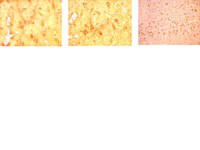Bardoxolone Methyl Prevents Fat Deposition and Inflammation in Brown Adipose Tissue and Enhances Sympathetic Activity in Mice Fed a High-Fat Diet.
Dinh, CH; Szabo, A; Yu, Y; Camer, D; Zhang, Q; Wang, H; Huang, XF
Nutrients
7
4705-23
2015
Show Abstract
Obesity results in changes in brown adipose tissue (BAT) morphology, leading to fat deposition, inflammation, and alterations in sympathetic nerve activity. Bardoxolone methyl (BARD) has been extensively studied for the treatment of chronic diseases. We present for the first time the effects of oral BARD treatment on BAT morphology and associated changes in the brainstem. Three groups (n = 7) of C57BL/6J mice were fed either a high-fat diet (HFD), a high-fat diet supplemented with BARD (HFD/BARD), or a low-fat diet (LFD) for 21 weeks. BARD was administered daily in drinking water. Interscapular BAT, and ventrolateral medulla (VLM) and dorsal vagal complex (DVC) in the brainstem, were collected for analysis by histology, immunohistochemistry and Western blot. BARD prevented fat deposition in BAT, demonstrated by the decreased accumulation of lipid droplets. When administered BARD, HFD mice had lower numbers of F4/80 and CD11c macrophages in the BAT with an increased proportion of CD206 macrophages, suggesting an anti-inflammatory effect. BARD increased phosphorylation of tyrosine hydroxylase in BAT and VLM. In the VLM, BARD increased energy expenditure proteins, including beta 3-adrenergic receptor (β3-AR) and peroxisome proliferator-activated receptor gamma coactivator 1-alpha (PGC-1α). Overall, oral BARD prevented fat deposition and inflammation in BAT, and stimulated sympathetic nerve activity. | 26066016
 |
Unique Effects of Acute Aripiprazole Treatment on the Dopamine D2 Receptor Downstream cAMP-PKA and Akt-GSK3β Signalling Pathways in Rats.
Pan, B; Chen, J; Lian, J; Huang, XF; Deng, C
PloS one
10
e0132722
2015
Show Abstract
Aripiprazole is a wide-used antipsychotic drug with therapeutic effects on both positive and negative symptoms of schizophrenia, and reduced side-effects. Although aripiprazole was developed as a dopamine D2 receptor (D2R) partial agonist, all other D2R partial agonists that aimed to mimic aripiprazole failed to exert therapeutic effects in clinic. The present in vivo study aimed to investigate the effects of aripiprazole on the D2R downstream cAMP-PKA and Akt-GSK3β signalling pathways in comparison with a D2R antagonist--haloperidol and a D2R partial agonist--bifeprunox. Rats were injected once with aripiprazole (0.75 mg/kg, i.p.), bifeprunox (0.8 mg/kg, i.p.), haloperidol (0.1 mg/kg, i.p.) or vehicle. Five brain regions--the prefrontal cortex (PFC), nucleus accumbens (NAc), caudate putamen (CPu), ventral tegmental area (VTA) and substantia nigra (SN) were collected. The protein levels of PKA, Akt and GSK3β were measured by Western Blotting; the cAMP levels were examined by ELISA tests. The results showed that aripiprazole presented similar acute effects on PKA expression to haloperidol, but not bifeprunox, in the CPU and VTA. Additionally, aripiprazole was able to increase the phosphorylation of GSK3β in the PFC, NAc, CPu and SN, respectively, which cannot be achieved by bifeprunox and haloperidol. These results suggested that acute treatment of aripiprazole had differential effects on the cAMP-PKA and Akt-GSK3β signalling pathways from haloperidol and bifeprunox in these brain areas. This study further indicated that, by comparison with bifeprunox, the unique pharmacological profile of aripiprazole may be attributed to the relatively lower intrinsic activity at D2R. | 26162083
 |










